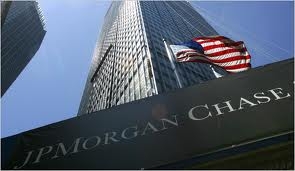
By Gareth Vaughan
JPMorgan Chase Bank says a big fall in its annual New Zealand profit was a normalisation after the previous year's profit was boosted by "opportunistic positions in New Zealand government guaranteed bonds."
Net profit after tax at the consolidated New Zealand operations of JPMorgan Chase Bank NA tumbled NZ$24.2 million, or 91%, to NZ$2.4 million in 2012 from NZ$26.5 million in 2011, according to the bank's latest General Disclosure Statement. The big fall came after total operating income sank NZ$37.7 million, or 73%, to NZ$13.8 million from NZ$51.5 million.
Income fell as the bank recorded a trading loss of NZ$8.6 million versus a trading profit of NZ$23.6 million in 2011. This figure incorporates gains or losses from direct hedging for single swap transactions. Trading revenue also includes realised and unrealised gains and losses arising from changes in the fair value of financial instruments.
Mark Lawrence, JPMorgan Chase's New Zealand CEO, referred questions from interest.co.nz to the group's public relations team in Australia. A spokesman responded via email saying; "The 2011 result was heavily reliant on opportunistic positions in government guaranteed bonds. Last year’s result reflects a far more normalised run rate." Asked for further detail he said the bonds referred to were New Zealand government bonds.
JPMorgan Chase bought ANZ's Custodian Services business in November 2009 and completed the migration of ANZ customers in 2010 in a move it said had increased the assets held under custody by JPMorgan in Australia and New Zealand by more than 20%. It also said more than 150 ANZ Custodian Services staff in Melbourne and Wellington had taken on jobs at JPMorgan.
The spokesman said JPMorgan had increased assets under custody since the ANZ deal, without providing specific details. He said JPMorgan offers a range of products and services in New Zealand across capital markets, fixed income, securities, custody and treasury services. It has 1,300 staff across Australasia, although he wouldn't specify how many of these are New Zealand based. The group has an office in Wellington.
After strong asset growth in previous years, total assets fell NZ$261.348 million last year to NZ$745.754 million after topping NZ$1 billion in 2011. JPMorgan Chase grew its assets by 113% in 2011, 186% in 2010 and 46% in 2009. According to KPMG's 2012 Financial Institutions Performance Survey, the bank's annual net profit after tax rose 182% and its net interest margin was 2.28%, unchanged from the previous year.
Asked whether asset growth was expected to resume this year, the spokesman repeated that; "The 2011 result was heavily reliant on opportunistic positions in government guaranteed bonds. Last year’s result reflects a far more normalised run rate."
Meanwhile, JPMorgan remained "focused on supporting and developing the New Zealand business. We will continue to explore business opportunities in the New Zealand market."
The bank grew loans by NZ$16.9 million, or 37%, to NZ$63.1 million in 2012. Its net interest income dropped NZ$5.5 million, or 33%, to NZ$11.4 million, and operating expenses increased NZ$984,000, or 12%, to NZ$9.3 million.
JPMorgan Chase's total liabilities fell NZ$224.696 million to bring them to an identical value as assets at NZ$745.754 million.
JPMorgan Chase's New Zealand branch alone recorded annual profit of NZ$422,000 versus a loss of NZ$2.2 million in 2011. Its total operating income was up NZ$567,000, or 5%, to just over NZ$11 million.
This article was first published in our email for paid subscribers. See here for more details and to subscribe.

We welcome your comments below. If you are not already registered, please register to comment
Remember we welcome robust, respectful and insightful debate. We don't welcome abusive or defamatory comments and will de-register those repeatedly making such comments. Our current comment policy is here.